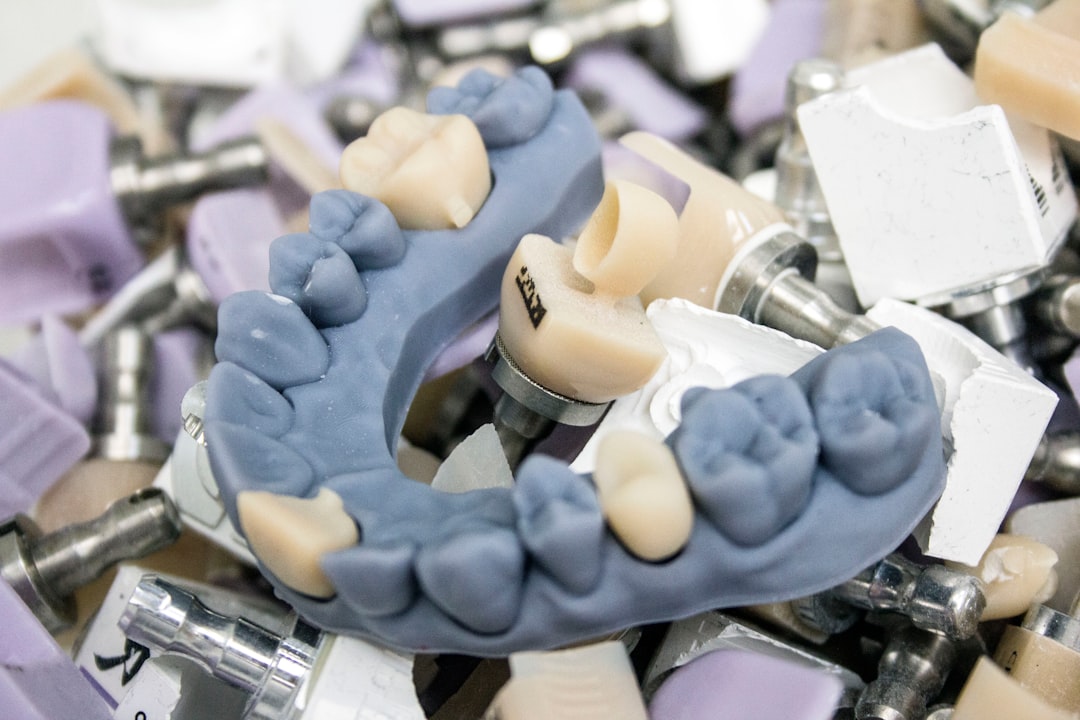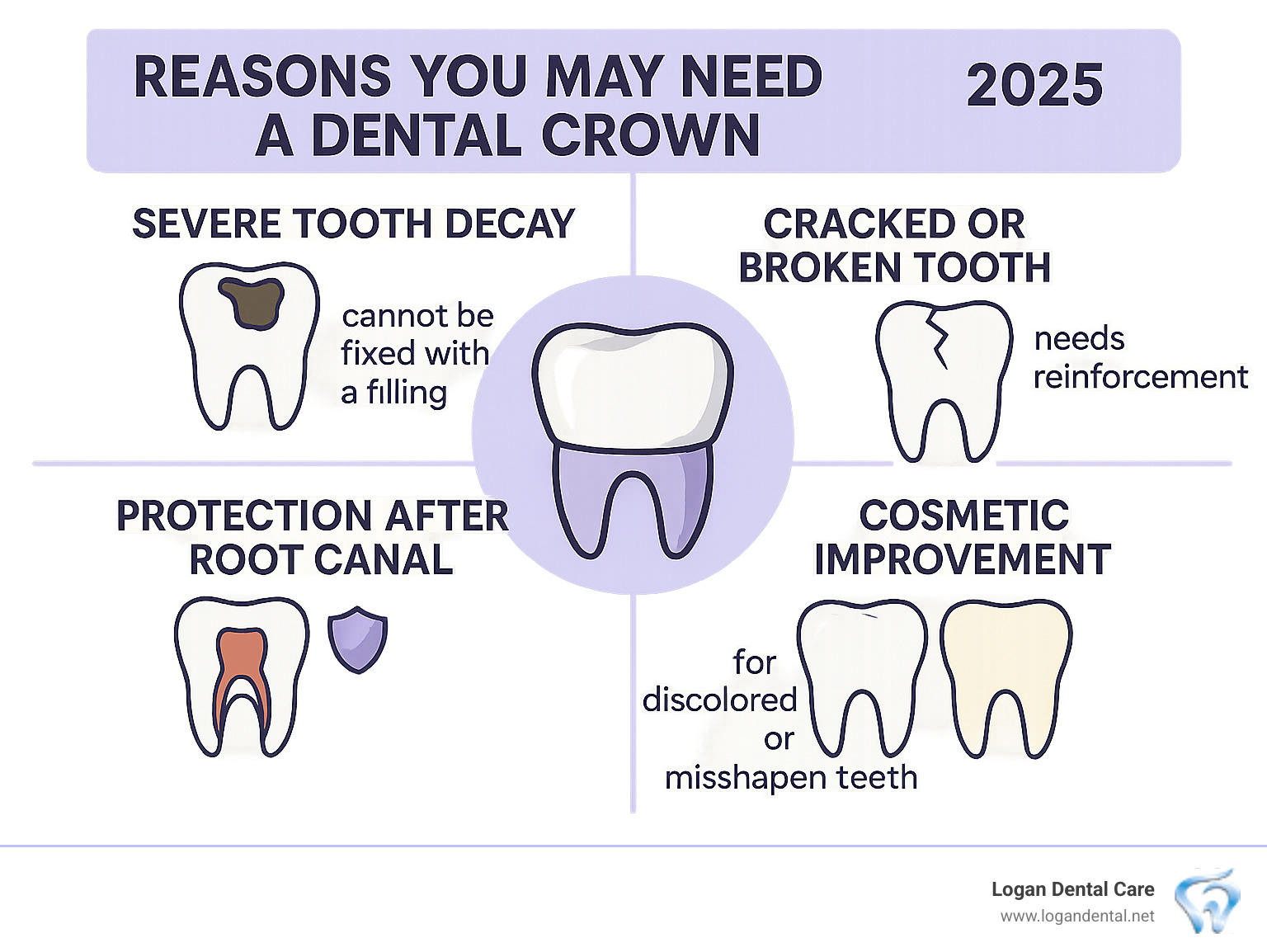The 5 Best Dental Crown Prices Compared

Your Guide to Understanding Dental Crown Costs
Dental crowns cost between $800 and $3,000 per tooth in the United States, depending on the material and your location. Here's what you need to know:
Quick Cost Breakdown:
- Metal crowns: $900 - $2,500
- Porcelain-fused-to-metal: $800 - $2,000
- All-porcelain/ceramic: $1,000 - $2,500
- Zirconia: $1,200 - $2,500
- Gold: $1,200 - $3,000
A dental crown is a tooth-shaped cap that covers a damaged or weakened tooth. You might need one after a root canal, to fix a cracked tooth, or to restore a tooth with extensive decay.
The cost varies based on several factors: the material you choose, your dentist's experience, where you live, and whether you need additional procedures like a root canal or core build-up. Most dental insurance plans cover about 50% of the cost since crowns are considered a major restorative procedure.
Understanding these costs upfront helps you plan for this important investment in your oral health. A quality crown can last 10-15 years or more with proper care, making it a worthwhile long-term solution for protecting your natural teeth.

Terms related to dental crowns cost:
A Detailed Breakdown of Dental Crowns Cost
A dental crown is a long-term investment in your oral health, but the price can vary significantly. Understanding what goes into the final dental crowns cost helps you make an informed decision for your smile and budget. We'll break down the prices by material and explore other factors that affect what you'll pay.
Comparing the 5 Main Types of Dental Crowns and Their Prices
When it comes to dental crowns, one of the biggest factors influencing the price is the material it's made from. Each material offers a unique blend of durability, aesthetics, and cost. Let's explore the five main types:
- Porcelain Crowns (All-Ceramic): Highly aesthetic, these crowns blend seamlessly with your natural teeth, making them ideal for the front of your mouth. Made entirely of biocompatible ceramic, they can last 5-15 years or more with proper care. The average cost is $1,000 to $2,500 per tooth.
- Porcelain-Fused-to-Metal (PFM) Crowns: These crowns combine a strong metal base with a porcelain exterior for a balance of durability and a natural look. The metal can sometimes show as a dark line at the gum line. They last 8-15 years, and the dental crowns cost is typically between $800 and $2,000 per tooth.
- Metal Crowns (Gold or Base Metal Alloys): Made of gold or other alloys, these are incredibly durable and perfect for back molars where chewing strength is critical. They require less tooth preparation and can last 7-20 years or longer. The cost ranges from $900 to $2,500 per tooth.
- Zirconia Crowns: Zirconia is a highly durable ceramic that offers excellent strength and aesthetics, making it a popular choice for both front and back teeth. These biocompatible crowns can last 7-20 years, with a dental crowns cost between $1,200 and $2,500 per tooth.
- E-Max Crowns: Made from lithium disilicate, E-Max crowns have exceptional translucency and a natural appearance, making them another excellent choice for front teeth. They are strong and typically used for single-tooth restorations, costing around $1,200.
Here's a quick comparison of these crown types:
| Material | Average Cost ($) | Key Benefit | Best For |
|---|---|---|---|
| Porcelain (All-Ceramic) | $1,000 - $2,500 | Highly aesthetic | Front teeth, natural look |
| Porcelain-Fused-to-Metal (PFM) | $800 - $2,000 | Balance of strength & aesthetics | Back teeth, where some metal might be visible |
| Metal (Gold/Alloys) | $900 - $2,500 | Superior durability | Back molars, heavy chewing |
| Zirconia | $1,200 - $2,500 | Strong & aesthetic | Both front and back teeth |
| E-Max | ~$1,200 | Excellent translucency | Single front teeth, natural appearance |
Key Factors That Influence the Final Dental Crowns Cost
Beyond the material, several other elements contribute to the overall dental crowns cost.
- Geographic Location: Dental costs vary by location. In the U.S., a crown in a major city might cost over $2,000, while the price in a smaller town could be closer to $800. In Ohio, for example, porcelain crowns can range from $655 to $830. Here in Bellefontaine and Logan County, OH, we offer high-quality care that reflects our community's values.
- Dentist's Experience and Expertise: An experienced dentist or a specialist like a prosthodontist may charge more, which often translates to a better-fitting, more durable crown.
- Procedure Complexity and Lab Fees: The condition of your tooth and the quality of the dental lab used to create the crown will influence the final price. These fees are typically included in your total cost.
- Additional Procedures: Often, other treatments are needed before a crown can be placed, adding to the total dental crowns cost. These can include:
- Initial Exam and X-rays: ($50-$250) for diagnosis and planning.
- Root Canal Therapy: ($762-$2,000+) if the tooth's pulp is infected. A crown is essential for protection after this procedure. Learn more in our guide: Your Guide to Root Canals and Crowns.
- Core Build-Up: ($150-$500) to create a stable foundation if significant tooth structure is missing.
- Post and Core: ($250-$650) to provide support for a crown after a root canal.
- Longevity: The lifespan of your crown is a key part of its value. With proper care, a crown can last 10-15 years or more, making it a worthwhile long-term investment. You can find more information on scientific research on crown longevity.
Understanding the Dental Crown Procedure and Aftercare
The dental crown procedure is typically completed in two visits.
- First Visit: The tooth is prepared by shaping it, and an impression is taken to send to a dental lab. A temporary crown is placed to protect the tooth while your permanent one is made.
- Second Visit: About two weeks later, the temporary crown is removed, and your new permanent crown is checked for fit and appearance before being permanently bonded to your tooth.
The Benefits of Crowns are Clear:Dental crowns restore a tooth's function, improve its appearance, and protect it from further damage, often preventing the need for more costly procedures. For more detailed information, read our article: More info about a Dental Cap.
Caring for Your New Crown:To ensure your crown lasts, maintain excellent oral hygiene by brushing and flossing daily. Avoid very hard or sticky foods, and attend regular dental check-ups. If you grind your teeth, a night guard can protect your crown from damage. Learn more about How to care for your crown with a night guard. Regular check-ups are vital, as decay can still form under an older crown if the seal weakens.
Making Your Dental Crown Affordable
We understand that looking at dental crowns cost can feel overwhelming, but there are several ways to make this important investment in your smile more manageable.
How Dental Insurance Can Lower Your Out-of-Pocket Costs
Most dental plans classify crowns as a "major restorative procedure" and cover around 50% of the cost. However, be mindful of your plan's deductible, annual maximum (usually $1,000-$1,500), and any waiting periods. Choosing an in-network dentist can also lower your out-of-pocket expenses.
We always recommend getting a pre-treatment estimate from your insurance company to avoid surprises. You can also use tax-advantaged funds from a Health Savings Account (HSA) or Flexible Spending Account (FSA) to pay for your portion of the dental crowns cost. For those without insurance, dental savings plans offer discounts without the hassle of deductibles or annual limits. You can learn more by Understanding dental insurance for crowns.
Exploring Alternatives to Dental Crowns
While crowns are often the best solution, some alternatives may be appropriate depending on your tooth's condition. We will always discuss the pros and cons of each option to find the best fit for your health, budget, and aesthetic goals.
- Large Dental Fillings: More affordable and conservative than crowns, but only suitable for smaller areas of damage. They do not provide the same level of protection for a weakened tooth.
- Inlays and Onlays: Often called "partial crowns," these are more durable than fillings and preserve more healthy tooth structure than a full crown. They are a good middle-ground option for moderate damage.
- Veneers: A cosmetic solution for front teeth, veneers cover the front surface to improve appearance but do not provide structural support for weak or heavily restored teeth.
Investing in Your Smile: Is the Dental Crowns Cost Worth It?
When you're weighing the dental crowns cost, it's helpful to view it as a long-term investment in your oral health. A crown can save a damaged tooth from extraction, preventing the need for more expensive procedures like dental implants or bridges. Lasting 10-15 years or more with good care, a crown is a durable, cost-effective solution that protects your natural tooth for years to come.
A crown acts as a protective shield, reinforcing weak teeth (especially after a root canal) and restoring your ability to chew and speak with confidence. Beyond its practical benefits, a well-made crown can dramatically improve your smile's appearance and boost your self-confidence.
At Logan Dental Care, we believe in treating our patients like family. We combine that small-town, personal touch with the latest technology to make sure you get the best possible care. We're here to walk you through every step of the process, helping you understand your options so you can make the best decision for your smile and your budget.
We're committed to helping you achieve and maintain a healthy, beautiful smile that you can be proud of. Learn more about our Crowns and Bridges services and find how we can help you invest in your oral health.


